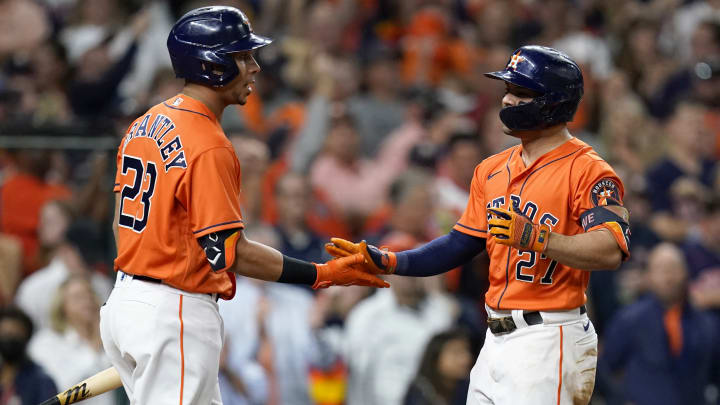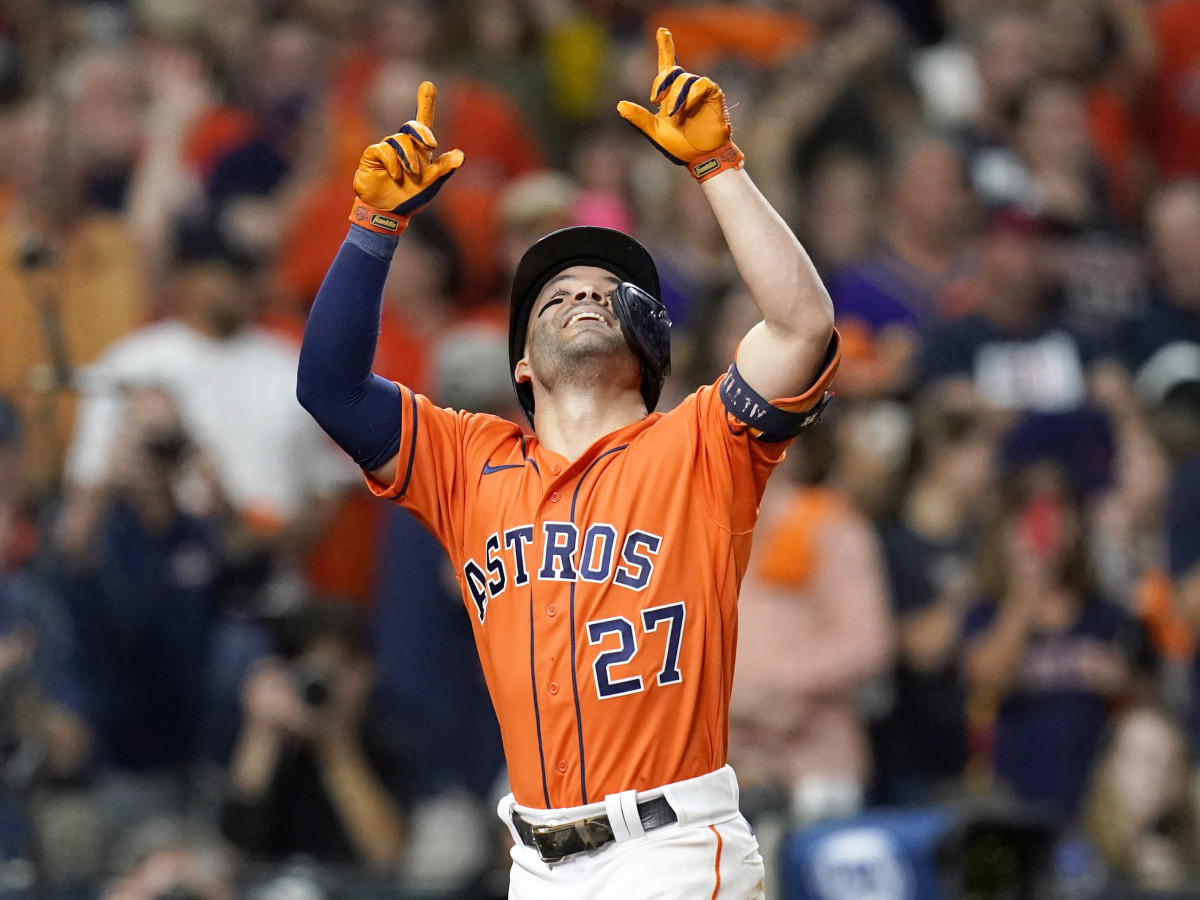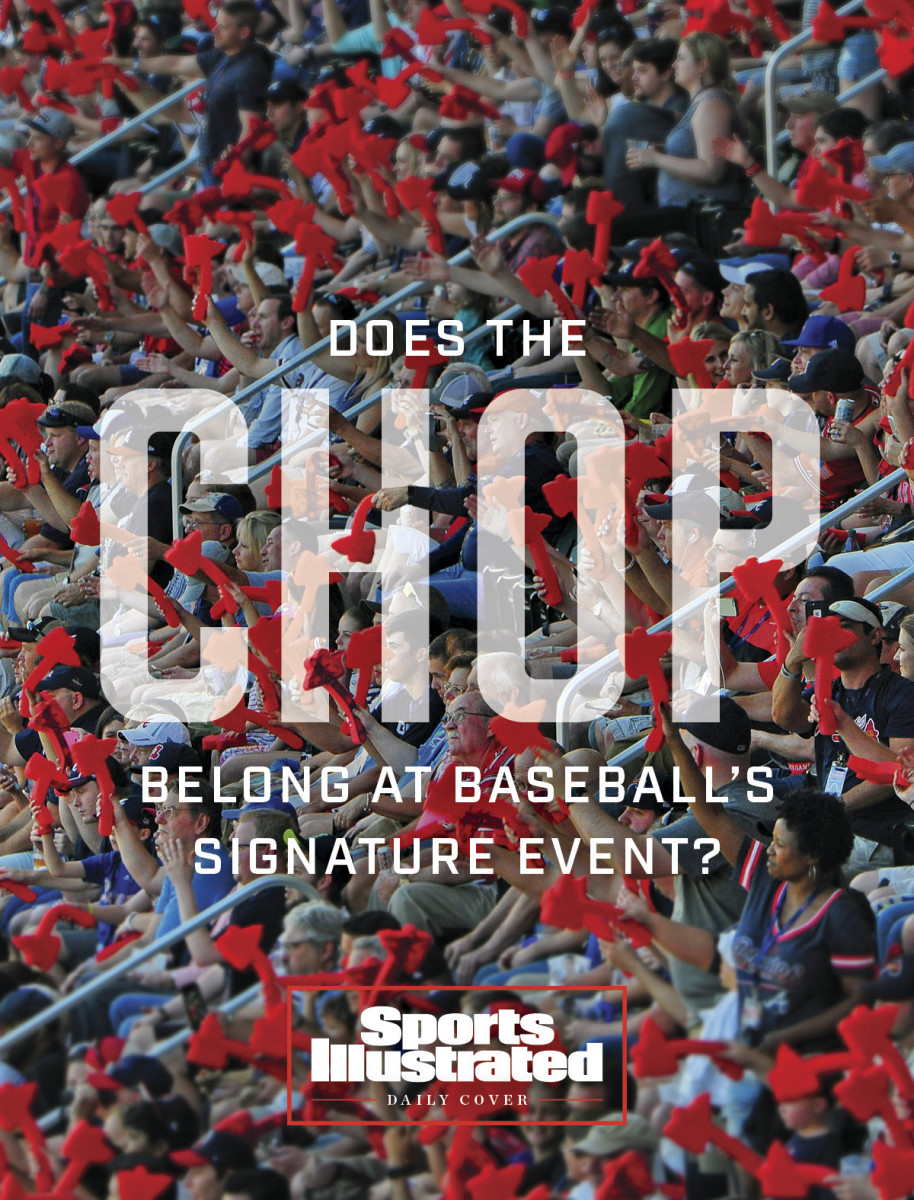The World Series Is Even—but the Scales Favor the Astros

The World Series is tied, 1–1, as the two teams (and our excellent writers) take their flights from Houston to Atlanta. Yet it does not feel like both teams are on equal footing.
The Astros have the deepest, most adaptable lineup in baseball. Their ways to beat you range from crushing dingers to peppering seeing-eye singles all over the field. Their 7–2 win in Wednesday night’s Game 2 featured a little bit of everything that this offense does so well. Jose Altuve led off the game with a double down the line, advanced to third on a deep fly out and scored on a sac fly. He led off the seventh with a home run into the Crawford Boxes to bookend Houston’s scoring.

But the most frustrating part of the barrage was the steady stream of soft contact in the second and sixth innings that either found holes for hits or pressured miscues from a typically stalwart Atlanta defense.
If you’re asking, “What in the name of Wee Willie Keeler was going on?” you’re not alone. Atlanta’s infielders are among the best in the league, as Stephanie Apstein detailed in her excellent column about last night's tumultuous second inning.
Meanwhile, Altuve—a combination of Keeler and Reggie Jackson—seems to have figured things out at the plate after having mostly struggled through the postseason thus far. Michael Brantley is 5-for-9 to start the World Series. Yordan Álvarez, as Craig Goldstein of Baseball Prospectus so aptly described Tuesday night, “is like the person version of those trucks that haul other trucks.” And then there’s Alex Bregman, Carlos Correa and Yuli Gurriel, the American League batting champion who somehow is Houston’s No. 7 hitter (!). Oh, and don’t forget about Kyle Tucker, whom Tom Verducci compared to Teddy Freakin’ Ballgame on last night’s broadcast.
It’s true this World Series is far from over. Atlanta has been down many times throughout the season—most notably with its sub-.500 record at the All-Star break—so it would be foolish to write the team off, even if it loses again in Friday night’s Game 3. The Astros faced a similar conundrum in the ALCS against the Red Sox—injured ace, pitching staff in shambles, uncharacteristic defensive woes—and came back to take two of three on the road before winning the series in six. We could very well see the same thing happen with Atlanta against Houston.
However, as of this writing, the scales are tipped in favor of the Astros—even with the World Series’ being even.
Have any questions for our team? Send a note to mlb@si.com.

1. THE OPENER
“Anyone tuning into World Series Games 3, 4 and 5 will be subjected to this synchronized racism dozens of times: any time the home team scores, any time the opposing team changes pitchers, any time it has been too long since a largely white crowd mocks a people its ancestors tried to erase.”
Is this what MLB wants its nationwide TV audience to see during the World Series? Evidently, says Stephanie Apstein. This is an important story for anyone who is unfamiliar with the context of the Atlanta franchise’s “overtly racist” tomahawk chop gesture.
I encourage you all to read Stephanie’s entire SI Daily Cover story, which you can find here.
2. ICYMI
Want to read more about last night’s Game 2? We’ve got you covered.
From One Mr. October to Another: Jose Altuve Snaps His Slump With the Help of a Playoff Legend by Tom Verducci
Houston’s Game 2 victory was aided by some advice from Yankees icon Reggie Jackson to its star second baseman.
Braves' Big Blunder Puts Game 2 Out of Reach by Stephanie Apstein
Houston evened up the World Series with some help from a rare, costly error by Atlanta’s infield defense.
Wondering what the heck Atlanta will do with its pitching the rest of the way? Same! That’s why we asked Emma to figure it out.
How Does Atlanta Handle Its Pitching Going Forward? by Emma Baccellieri
The task ahead: Navigate MLB’s top-scoring team using a two-man rotation and a bullpen that's already heavily relied-upon.
Miss our brilliant profiles of the two World Series managers? Here you go!
Dusty Baker’s Time Is Now by Tom Verducci
His managing is defined by having won more games without winning the World Series than anyone in history. His story is about more than the one thing it’s missing.
He’s Old-School. He Doesn’t Embrace Analytics. And He's Thriving by Chris Ballard
Brian Snitker waited 40 years to get his shot. There may never be anyone like him again—and that may be exactly why he’s had so much success.
3. WORTH NOTING
Tom Verducci writes: Remember when Joe Pederson was thrown out at third base on a grounder to shortstop in Game 1? It may not have been the dumb play many presented it to be.
The Braves were up 2–0. With catcher Travis d’Arnaud at third and Pederson at second and one out, Houston manager Dusty Baker chose to play his infield back, curiously conceding another run to his deficit. Jorge Soler hit a ground ball to shortstop Carlos Correa. Pederson, with the ball in front of him, ran into an easy out at third. According to a Braves source, it was a smart play.
“He made sure the run scores,” the source said. “Correa has a cannon. Even with the infield back, with a ball right at Correa and d’Arnaud running there is a chance he throws home. Once Joc runs, there is no chance he throws home. He assures d’Arnaud scores. We take the run.
“I know what it looks like, but Joc is a very smart player. His instincts are very good.”
Matt Martell writes: Eddie Rosario is mortal after all. Last night was the first time he was held hitless in a playoff game this year.
In his first 11 games this postseason, the Atlanta left fielder had a .465/.511/.767 slash line with three home runs and 11 RBIs. Before his hitting streak was snapped, he had multiple hits in each of his last four games and in five of his last six.
Still, his second-inning lineout to first base had a .510 expected batting average, per Statcast. So based on his quality of contact (exit velocity and launch angle), that swing would’ve resulted in a hit more often than not—meaning his playoff hitting streak likely would’ve reached 12 games had he not ripped it right at Astros first baseman Yuli Gurriel.
4. WHAT TO WATCH FOR from Will Laws
Thursday marks an off day as both teams travel to Atlanta for a full weekend of baseball. Even though the Braves stole home-field advantage during their stay in Houston, the Astros have to feel good about their chances to win a title given Atlanta’s limited starting pitcher options going forward. With Charlie Morton injured, Max Fried’s throwing 86 pitches in Game 2 (and being charged with six runs in the process) and potential Game 4 starters Drew Smyly and Kyle Wright both making appearances Wednesday, Atlanta finds itself in a similar position to where the Dodgers were in the NLCS—forced to either dial up two consecutive bullpen games at some point or tell a top-tier starter who hasn’t shown the ability to pitch well on short rest to do just that.
With that in mind, it will be absolutely critical for Ian Anderson to make it through at least five innings relatively unscathed in Game 3. If not, this series could get ugly. There will be no rest days for the bullpen for the next three contests, and Atlanta has no obvious candidate to give quality bulk innings in the latter two. Anderson’s main out pitch is his changeup, a 70-grade offering that ranked as the 10th most valuable of its kind this season. The Astros, however, graded out as the second-best changeup-hitting team in the majors this year (Atlanta, coincidentally, was first). Something’s gotta give Friday.

5. THE CLOSER from Emma Baccellieri
The Astros got a considerable chunk of their offense in Game 2 from soft-hit singles—not their usual M.O., by any means, but it did the trick. Can they count on getting so many hits on that going forward? Not really. But it does reveal something worth pointing out about their offense. Houston put the ball in play more than any other team this season: Its .267 average was the highest in baseball. It was also the only club to record a strikeout rate below 20%. There are plenty of other factors that make the Astros’ offense successful. But to put the ball in play more is to give yourself more chances to succeed, and on Wednesday, they proved just how fruitful that can be—one slow single at a time.
That’s all from us today. We’ll be back in your inbox tomorrow. In the meantime, share this newsletter with your friends and family, and tell them to sign up at SI.com/newsletters. If you have any questions or comments, shoot us an email at mlb@si.com.
